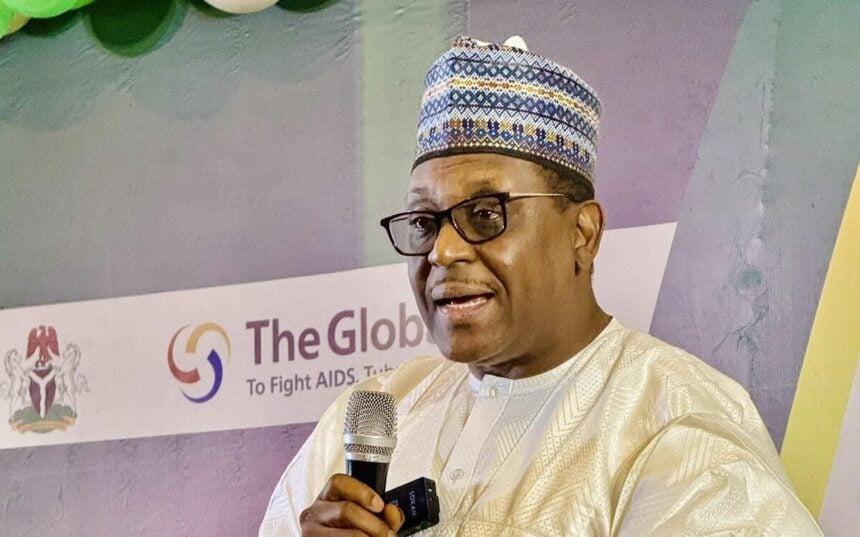The Coordinating Minister of Health and Social Welfare, Prof. Muhammad Ali Pate, has disclosed that Nigeria’s health sector is largely funded domestically, with external funding accounting for less than 10% of the total health spend.
He said the health accounts since 2005 have consistently shown that total external funding for Nigeria’s health sector is less than 10% of the total health spend, with 90% being domestic — about a third from public sources and two-thirds from private out-of-pocket expenditure.
Speaking on Monday at the National Workshop on AIDS, Tuberculosis, and Malaria (ATM) — a strategic forum bringing together national and sub-national leaders, development partners, civil society, and technical experts to accelerate Nigeria’s efforts towards eliminating these diseases — Pate stressed the importance of domestic investment in health.
The National Generative Workshop, themed “Design a Transition Pathway to Self-Reliance in Financing Essential Health Services in Nigeria”, was organised in collaboration with the ATM Technical Working Group (TWG).
Pate noted that the federal government has invested more in health and is encouraging states to join in and contribute to the effort.
“The federal government had invested more in terms of health, and that we’re encouraging states also to join us so that they contribute and complement,” he said.
The minister emphasised the need for Nigeria to exit dependency on external funding and begin to manufacture its own drugs and commodities, as he called on development partners to use national systems rather than their own systems, and to patronise local manufacturers.
Pate noted that the recent suspension of donor-funded assistance and cuts underscores the urgency of reinforcing sustainable, country-led systems to strengthen local institutions and take full programme ownership.
“The recent suspension of donor-funded assistance and cuts that we have seen underscores the urgency of reinforcing sustainable country-led systems to strengthen our local institutions and take full program ownership to ensure a long-term impact,” he said.
“The current global health architecture is fundamentally unsustainable and that Nigeria cannot build a healthy nation on the back of other people’s money.
“Those programs, the way the global health architecture was constructed, are fundamentally unsustainable with the level of resources that we have,” he said.
“We encourage our partners to use national systems, not just make us dependent by using their own systems. Secondly, to buy local and to encourage our local manufacturers to be patronized so that we get the muscle strength as a country to produce what we need.”
The minister noted that the federal government has increased the resources allocated to health and released the budget to enable the purchase of necessary commodities.
“The federal government has done that, but with the increased resources going to the states, we’re asking state governments also to increase the resources they allocate to HIV, TB, malaria, family planning, and reproductive health,” he said.
Pate expressed optimism about the progress being made, citing the commitment of state governors and senior officials. “It’s been very good, as you can see, almost all the states are here, the senior officials are here, and our partners also are respecting that, that we’re taking responsibility,” he said.
Pate said the federal government has taken steps to improve the governance of health programmes and coordinate them better. He added that the government is working to improve domestic resource mobilisation and encourage states to contribute to the financing of health programmes.
“We would want the state governors to also deploy some of the revenues that they are getting from the improved fiscal situation in the country, towards commodities, or some other programmatic costs,” he said.
Pate reiterated that Nigeria needs to take ownership of its health sector and reduce dependence on external funding.
“Our task is very complex, but it depends also at the same time. I urge all of you to deploy yourselves so that we come out with a roadmap, not only the what, but the how and the when for those questions,” he said.
Also speaking, the Director General of the National Agency for the Control of AIDS (NACA), Dr. Temitope Ilori, pointed out the importance of integrating services to achieve efficiency.
“This year, the Technical Working Group on HIV, Malaria and Sexual Poverty was inaugurated about seven months ago. The idea is that we should come together to solve this so that we can integrate services more efficiently,” he said.
Ilori explained that the working group aims to develop frameworks to integrate services, reduce costs, and absorb human resources affected by the changes in global funding.
ALSO READ: ICPC, NDPC join forces to shield Nigerians’ data, tackle corruption
“Not only in terms of resource organization but also in terms of even the programmatic aspect… how we can develop frameworks to go past that indigenous, that whole group and not just with the new partners that have been doing it for Africa, but trying to get bridge and augment those structures to see how best we can offer the services in a cost-efficient way,” he said.
Ilori also stressed the importance of cooperative intervention modules in the health sector. “The health sector we are initiating emphasizes the need for co-operative intervention modules. We must see this crisis not only as a challenge, but also as an opportunity to accelerate progress towards that vision.”
Ilori expressed gratitude to all stakeholders for their collaboration and commitment to the cause. “I give you all a very thankful collaboration as we work to position our programmes to contribute to the needs of the people in alignment with the whole vision.”
ALSO READ TOP STORIES FROM NIGERIAN TRIBUNE
WATCH TOP VIDEOS FROM NIGERIAN TRIBUNE TV
- Let’s Talk About SELF-AWARENESS
- Is Your Confidence Mistaken for Pride? Let’s talk about it
- Is Etiquette About Perfection…Or Just Not Being Rude?
- Top Psychologist Reveal 3 Signs You’re Struggling With Imposter Syndrome
- Do You Pick Up Work-Related Calls at Midnight or Never? Let’s Talk About Boundaries






